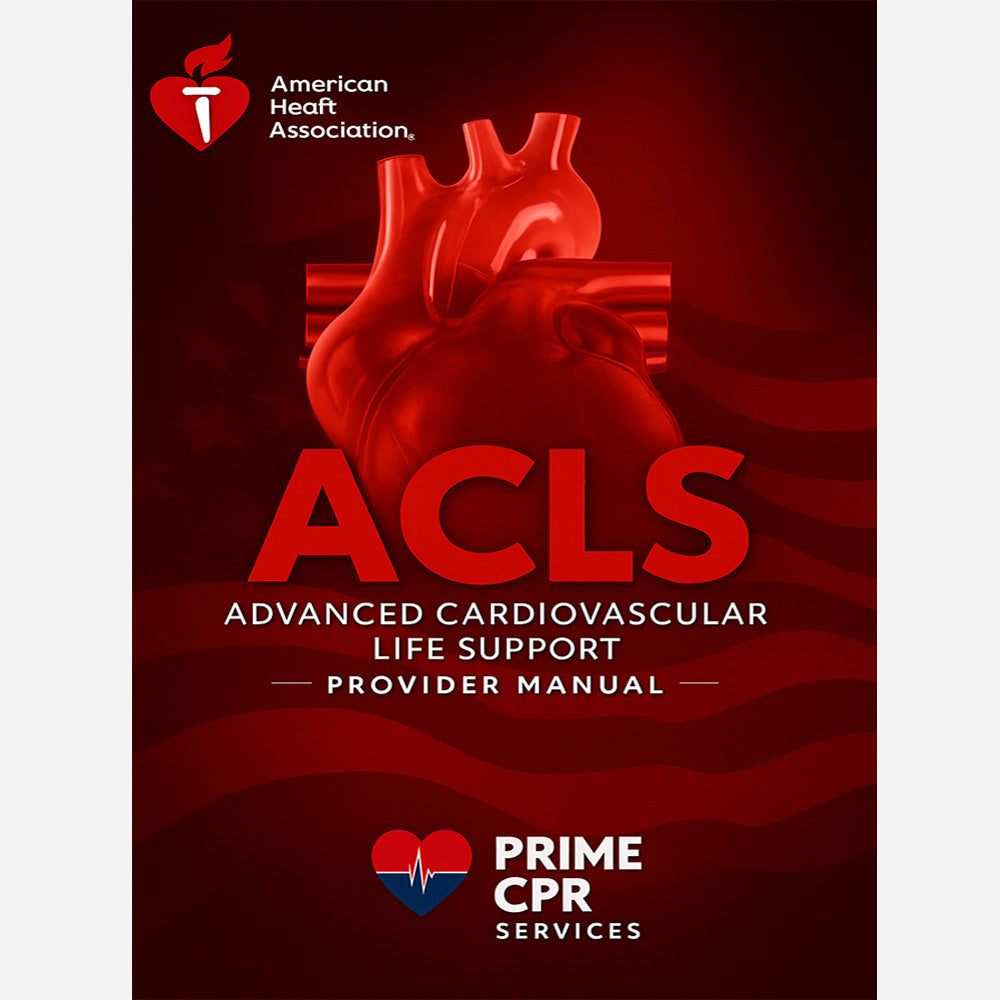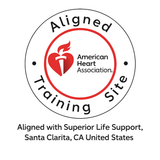Understanding the Importance of ACLS Certification
Prime CPR Services teaches the AHA NEW ACLS course in a calm and laid-back learning environment. It incorporates the most up-to-date guidelines from the American Heart Association Guidelines for Cardiopulmonary Resuscitation and Emergency Cardiovascular Care. This course is specifically tailored for healthcare professionals working in emergency departments, intensive care units, critical care departments, surgical areas, or pre-hospital environments, including physicians, nurses, paramedics, respiratory therapists, and other responders to cardiovascular emergencies. We will explain everything in a simple and memorable way, making understanding and retention effortless.

If you need a book, we ship priority, so you receive them well in advance of your scheduled class. You may also consider alternative book options by getting a ACLS ebook by clicking HERE
NEW ACLS relies on lifelike simulations that strengthen the core principles, including:
-
BLS Review:
Basic Life Support (BLS) skills are reviewed. High-quality CPR for adults, children, and infants, use of a Bag Valve Mask (BVM), use of an Automated External Defibrillator (AED), and relief of choking. -
Systematic Approach:
Assessment, Identification of rhythms, and appropriate interventions. Effective team dynamics, Roles and Responsibilities during a resuscitation, Management of a patient in cardiac arrest or other cardiovascular emergencies. -
Airway Management:
The class covers airway management techniques, including endotracheal intubation and use of supraglottic airways. -
Acute Coronary Syndromes and Stroke:
Information on the management of Acute Coronary Syndromes (ACS) and stroke, including assessment and initial interventions. -
Rhythm Recognition:
Ventricular Fibrillation (VF) and Pulseless Ventricular Tachycardia (VT), as well as non-shockable rhythms like Asystole and Pulseless Electrical Activity (PEA). Sinus Bradycardia, and Supraventricular Tachycardia (SVT). -
Electrical Therapy:
Defibrillation, Cardioversion, and Pacing. -
Pharmacology:
Indications, Dosages, and Administration routes of Atropine, Amiodarone, Adenosine, Epinephrine, and Dopamine. -
Resuscitation Scenarios:
Hands-on practice for scenarios for Sinus Bradycardia, Supraventricular Tachycardia (SVT), Ventricular Tachycardia with Pulses (VT), Ventricular Tachycardia without Pulses (VT), Ventricular Fibrillation (VF), Asystole, and Pulseless Electrical Activity (PEA). -
Post-Cardiac Arrest Care:
Critical care following Return of Spontaneous Circulation (ROSC), including targeted temperature management and other post-cardiac arrest interventions.
Feel free to call, text or email us if you have any questions or concerns.
What is ACLS Certification?
ACLS certification, or Advanced Cardiac Life Support certification, is a critical training program for healthcare professionals. This course teaches techniques for responding to cardiac emergencies effectively. Understanding ACLS protocols is essential for individuals working in emergency medicine, anesthesiology, and other healthcare fields. Therefore, obtaining ACLS certification is an important step in providing high-quality patient care because it equips professionals with the necessary skills to save lives.
Benefits of ACLS Training
ACLS training offers numerous benefits. For one, it improves a healthcare provider's capabilities in managing cardiac arrest and other life-threatening situations. Moreover, the skills learned through this program can significantly increase a professional's confidence in emergency scenarios, leading to quicker response times. Patients benefit from higher survival rates because trained professionals know how to act swiftly and efficiently during critical incidents. This is why many medical facilities require their staff to be ACLS certified.
Getting Certified in ACLS
The process to achieve ACLS certification is straightforward. Typically, it involves completing an accredited course, which includes both theoretical and practical components. Participants engage in hands-on simulations and case studies, enhancing their learning experience. After successfully passing the examination, individuals receive their ACLS certification, which is valid for two years. Therefore, it is essential to renew the certification periodically to stay updated with the latest protocols and guidelines in emergency care.



